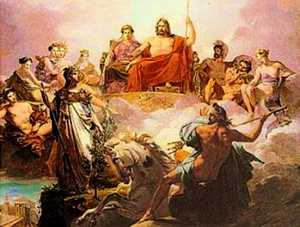First of a couple of backtracks here before completing the Offering of Isaac’s / Sacrifice of Jesus series. Based on Levenson’s The Death and Resurrection of the Beloved Son.
According to what Eusebius tells us in his Praeparatio Evangelica, one passage Philo of Byblos wrote of sacrifice among the gods:
It was a custom of the ancients in great crises of danger for the rulers of a city or nation, in order to avert the common ruin, to give up the most beloved of their children for sacrifice as a ransom to the avenging daemons; and those who were thus given up were sacrificed with mystic rites. Kronos then, whom the Phoenicians call Elus, who was king of the country and subsequently, after his decease, was deified as the star Saturn, had by a nymph of the country named Anobret an only begotten son, whom they on this account called ledud, the only begotten being still so called among the Phoenicians; and when very great dangers from war had beset the country, he arrayed his son in royal apparel, and prepared an altar, and sacrificed him.’
Kronos or El sacrificed his son to put an end to the “very great dangers from war that had beset the country.” The same motif is found in the Bible where King Mesha also offered “his first-born son, who was to succeed him as king” to end the siege of his city. See 2 Kings 3:27. In both cases a king sacrifices his royal heir.
Elus is otherwise known as El, and is also known by the same name and in the same supreme role in the Hebrew Bible, and sometimes equated there with YHWH.
Iedud is, following Levenson, better spelled Iedoud to reflect Eusebius’s Greek.
Another manuscript tradition names this only begotten son of El Ieoud rather than Iedoud (Levenson, p.27).
The only begotten son
Ieoud is most likely the same as the Hebrew word yachiyd, the only, the solitary one, the only begotten.
This word is prominent in stories of child sacrifice: Continue reading “Beloved and Only Begotten Sons Sacrificed by Loving Fathers (Offering of Isaac, 5)”

